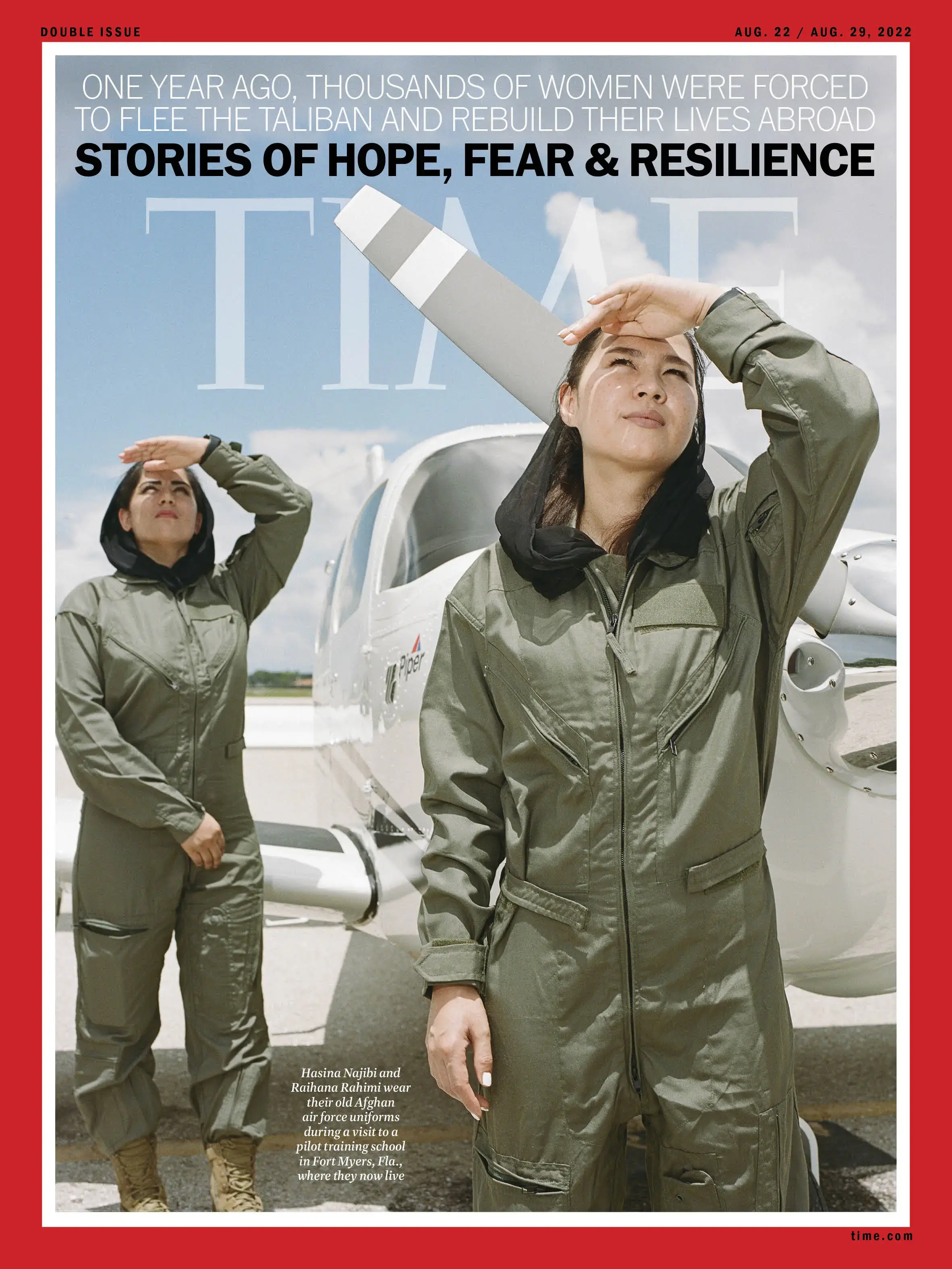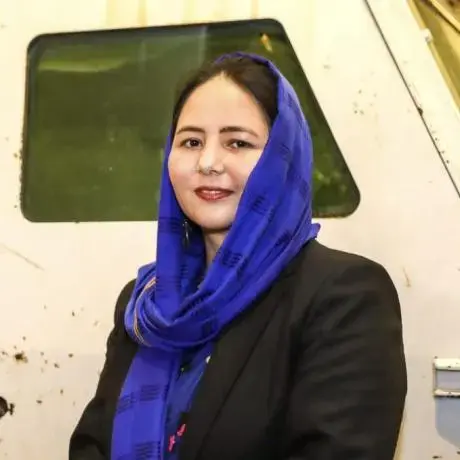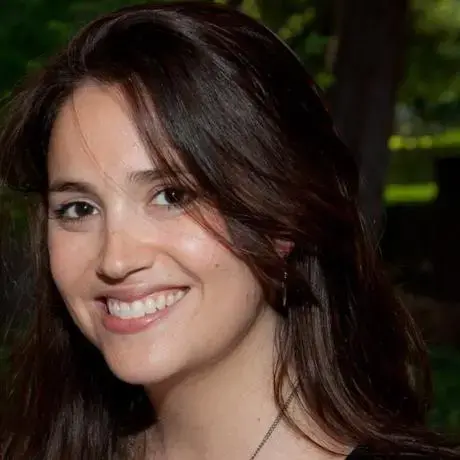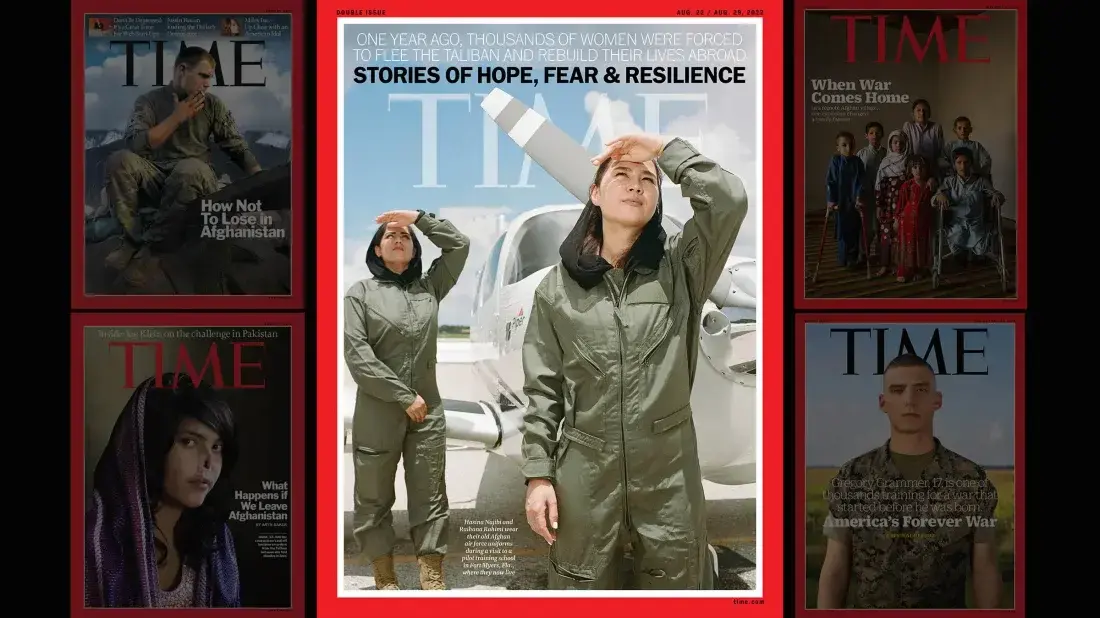When Kabul, Afghanistan, fell to the Taliban in August 2021, Pulitzer Center grantee Zahra Joya was airlifted from her home to the United Kingdom, where she sought asylum in London. She had been working as a journalist with the news agency she founded, Rukhshana Media, which focuses on stories by and about Afghan women. She feared for her life as a Hazara woman who has reported critically on the Taliban. Nevertheless, she stayed focused on telling stories about her country while in exile abroad.
That’s when grantee Amie Ferris-Rotman, a British-American journalist, reached out to Joya and proposed working with Rukhshana Media on a feature story about the women who, like Joya, were forced to flee Afghanistan.
Although media attention turned toward the country after the withdrawal of U.S. troops and the struggle that ensued, Ferris-Rotman says that much of the reporting portrayed the refugees who escaped to Western countries as the lucky ones—the ones who got away. Ferris-Rotman and Joya wanted to show the challenges of being displaced, separated from family, and forced to create a new life in a foreign country.
Their collaboration and the Pulitzer Center’s support led to a TIME magazine cover story, “Far From Home.” The story profiles seven cases of Afghan women now living in Brazil, France, Ireland, Italy, the U.K., and the U.S. Through photographs and personal interviews, these women reflect on what they miss about their old homes, how they feel about their new homes, and how they see themselves now. The journalists and photographers working on the stories were also women, many of them Afghan women, coordinating from around the world.
One year after the fall of Kabul, to have two Afghan women featured on the cover of TIME magazine sends a message to the Taliban and the patriarchal systems in power, according to Joya.
Pulitzer Center Editorial Intern Grace Jensen spoke with Ferris-Rotman and Joya about media coverage of Afghanistan, the process behind their project, and the message they hope that these women’s stories send to those who would rather silence them.
This interview has been edited for length and clarity.

Grace Jensen: What has your journey in journalism looked like, and how has journalism changed since you first started?
Amie Ferris-Rotman: I would say my journey is atypical in that I started out as a business journalist reporting on really dry things like steel markets [and] the former Soviet Union for a business publication. [When] I went to Reuters, I stayed on business news.
Then I moved to Russia, and things really changed. I started reporting actually on people, and movements and things that often get overlooked by the main press. And that's when I also started developing an interest in issues that impact women, which I would say is one of the main reasons I then wanted to move to Afghanistan, which I did also with Reuters in 2011.
The women's rights story in Afghanistan is, sadly, the most important women's rights story, I'd say, in the world. Afghan women are also the strongest people I've met in the world—maybe those two things go together—and so that's when I completely changed how I want to be a journalist. And then I actually became interested in helping other journalists, women journalists in Afghanistan, as well. So that's what I then moved into, and then I became a journalism innovator and [later] founded a program for Afghan women journalists called Sahar Speaks. I did that for a few years, and then I went back into on-the-ground reporting and joined The Washington Post in Russia. And from there, I also did more reporting in Kabul.
So it's always been kind of bouncing around between these two countries, which I love very much. [They] are very complicated countries and unfortunately have leadership issues that affect people's rights in a very bad way at the moment.
Zahra Joya: Actually, when I graduated from school, I didn't know about journalism and the profession. It was my dream that I want to become a prosecutor or a lawyer. Then when I came from the village to Kabul … There were a lot of stories among my classmates, and one of my friends, she worked with a local news agency, and she introduced me to her office. So for three months, I just worked as a volunteer to know how [to] work as a journalist, how to recognize the role and what is journalism. After that, I started my job as a journalist and … I covered political issues, and then after that, for five years I worked with local journalists with a local news agency, and then I started my work with a famous newspaper in Kabul. I started my investigative reports on women and children. So, for almost 11 years, [I've been] working as a journalist, and in 2020 I started Rukhshana Media to help women journalists, to give them that platform in Afghanistan.
GJ: What do you think about the way that Afghanistan has been covered by U.S. media in the past year?
AFR: I think, quite rightfully, a lot of the U.S. and U.K. press over the last year since the fall of Kabul to the Taliban has focused on [the] women's rights situation. And I think that's very good, especially because the United States invaded Afghanistan [and] the United Kingdom was the second-largest troop contributor in the NATO-led war. Both countries had an enormous responsibility to protecting women's rights, which they had pledged repeatedly that they would do. Due to the fact that the Taliban came to power and took away Afghan women's rights so quickly and methodically, it is definitely the duty of the Western press to cover that, and I think they covered it. They focused on it, which is what needed to happen.
I think the best work on the fall of Afghanistan has been done by Afghan journalists like Zahra and Rukhshana Media. But that's, I guess, different from American and British. Although, I think Rukhshana is now British. Right?
ZJ: Yes (laughing).
ZJ: I agree totally with you. Because it's very good to have some reports from Afghanistan, about women issues … about the [humanitarian crisis]. One thing that's very important is that, unfortunately, after the Ukraine war, most of the journalists and the media are forgetting Afghanistan. Still, some of the few media journalists are working with us on Afghanistan issues, which is helpful.
I hope the media, foreign journalists and the Western media don't ignore Afghanistan and cover the situation of my country because it is a very dark moment in the [country’s] history. The Afghan people are suffering a lot. So it is very good to have journalists and the media from foreign Western countries put attention again on Afghanistan’s situation.


GJ: How did TIME partner with Rukhshana Media and form a team of female journalists? Why was it important that women journalists tell these stories?
AFR: So it was a conscious decision to have a 100% female team—photographers, editors, and writers—on this project, and it was obvious to me and to Zahra, and to Naina [Bajekal] at TIME magazine, the executive editor, that we needed to partner with Rukhshana. Rukhshana is an amazing organization run by Zahra Joya, but most importantly, it's a news organization dedicated to the stories about Afghan women. Zahra runs her newsroom from London in exile and has managed to do that over the last year.
I also think crucially, what we saw a lot of during the war in Afghanistan were a lot of non-Afghan people reporting on Afghan women's rights, myself included. And I think, hopefully, what we learned is that this is not always the best, that you need to have Afghan women reporting on Afghan women's lives. And I think that's why it was crucial for TIME magazine and the Pulitzer Center to support Rukhshana Media on this. And as you can see, the cover of this story … the photographer is not Afghan, she's Turkish, actually. But it's two Afghan women on the cover, and it’s Farahnaz Forotan’s story, and she is an Afghan female journalist who was evacuated to the United States in the last year. She's the one who wrote that story and found that story. So I think that for the one-year anniversary of the fall of Kabul, nothing better says resilience like having an Afghan female journalist write a story and have Afghan women on the cover of TIME magazine. That's how it should be at this stage that we're at.
ZJ: Yes. Actually, it was a huge privilege for my team [at] Rukhshana Media. So I'm very grateful for Amie and TIME magazine and the Pulitzer Center. Because I remember that in past years, most of the journalists who were working with the foreign media were men, not women. So because of that, it is very important for us to show the men and the others [that] Afghan female journalists have this ability, this capacity. And because of that, I'm very happy that after a very difficult year, after the Kabul fall, two Afghan women who were the pilots of the national air force are on the cover of TIME. So that's very nice, and it's very powerful. It shows the Taliban the power of women, so it was huge for us.
GJ: How did you initially envision this project, and how did you get in contact with these women around the world?
AFR: I think very early on, we realized the power of this project would come from the fact that it's so global. So this is not about a group of women who all evacuated [to] the United States or the United Kingdom, the two largest troop contributors in the war. It had to be a package that reflected the fact that Afghan people and Afghan women are scattered all over the world after the collapse of the Afghan government last year. So that's why we picked Italy, France, Ireland, Brazil, in addition to the United States and the United Kingdom, to show the global nature of it.
We also wanted to show women who had been evacuated in the last year. So of course, the Afghan diaspora is huge. There are [long-established] Afghan populations all over the world, even going back to the 1970s when the Soviet Union invaded Afghanistan. But we really wanted to focus specifically on women who have left Afghanistan, like Zahra, in the last 12 months, since the fall. And sadly, there is no shortage of them.
However, that doesn't mean it was easy to find them all. We wanted to have a really good mix. And the Rukhshana team worked very hard to get some of these women. [Zahra] looked for ages to find a woman who was an older woman, because we also wanted all the generations reflected in this project. Because Afghanistan is a very young country, two-thirds of the country are under the age of 25. So it would be very easy to just pick a bunch of young women, but we didn't want to do that. We wanted to show women who have had children, women who are older who haven't had children, women who could be grandmother age, as well as really young women who are in their late or early 20s. But yeah, I won't reveal all the secrets [to finding them], but suffice it to say Zahra worked extremely hard on this effort.
ZJ: Yes. It was very hard. We just tried to find specific people or specific stories. I think it was for almost four months or three months.
AFR: Yes. I think I first brought the idea to TIME in December, just floated it. And they were, of course, very interested. But it was quite early days, like only a few months after the Taliban takeover. But then the last few months it was all hands on deck. It was a lot of work. But Zahra’s right, I think it sends a big message to the Taliban, which I think is good.
ZJ: Not only [to] the Taliban because, unfortunately, Afghanistan is a patriarchal society. So it was a big message for all of those men who have a very extremist view against the women. So that's—no matter how difficult it was, how it was a lot of work—the message was strong and powerful. That's very impressive.
GJ: What role did photography play in this project?
AFR: Photography here played a huge role. And I must say that's completely TIME magazine's work and their expertise. I had no role in that. Zahra and I are writers, but the photography is very important, and a Magnum photographer took the front cover story image. We also have an Afghan photographer, woman reporter, Fatimah Hossaini. She took the portraits of the women in France and in Italy. And then we have other women photographers working around the world. And the photography is beautiful. It obviously brings it all together. And it shows the true kind of kaleidoscopic nature of the story that these women are literally all over the world.
We also wanted to have some unique details, so we were interested in the items that the women brought with them. A lot of them had to escape in dangerous conditions and leave literally overnight, and many of them brought just the clothes they were wearing, or the earrings they were wearing, or their cell phones. And that's it. That's all they had of their lives in Afghanistan, so the photography focused on that, as well as portraits. In the case of the Afghan air force pilots who were on the cover, they had managed to bring a set of uniforms, and they love putting on their Afghan air force uniforms and remembering how it felt. It brings them great sadness because of what they've lost, but [it] also gives them hope and reminds them of who they are. The woman who we interviewed in London had a set of gold earrings that her late mother had given her; she was wearing them when she left. So those were photographed. It brought this real intimacy to the story, which I thought worked really well and was beautiful.
ZJ: Yeah, that's true. I think the photographers were great. And they showed the real story, the whole story for the audience.

GJ: What were the challenges in telling these stories? Zahra, I know you had to leave Afghanistan after the fall of Kabul yourself. Did that make it challenging for you?
ZJ: Of course, working in exile is full of challenges, to be honest. But in this project, we had very professional journalists, [like] Amie ... It was great because we have a very professional team and it was very helpful. So for me, my experience working in exile as a journalist is very, very different because when you are a journalist and are on the ground, it is very easy, because you have access to the information, you have your local source, [and] a lot of facilities, but here, it's very difficult. The one thing that I'm facing is the time-zone difference, and other things. It's the lack of access to information that's very, very difficult for me. On the other hand, unfortunately, the Taliban are a dangerous group. They didn't want the female journalists to be on the ground or to work as a journalist in the media landscape. So that's why it is important for me to keep female journalists and the media outlets in Afghanistan.
AFR: Yeah, the main challenge, besides the logistics that Zahra mentioned—and this is so sad, but speaks to the power and nature of the work we're doing—is the number of women that we were going to speak to reduced, because some of them backed away from speaking after men in their families didn't want them to, which was really sad because these women clearly wanted to speak to the press. So that was very difficult to deal with.
The second reason why our number shrank was because they feared for their family’s safety. They had already left Afghanistan, but Afghans have very large families. And so they had brothers, sisters, nieces, nephews, [and] parents still in Afghanistan. They would say, “Actually, I'm really worried that if my photograph ends up in TIME magazine, the Taliban will harm my family.” That's a very legitimate fear, and there are threats like that, so we have to be really careful and very considerate as well. If someone feared for their family, we immediately said, “OK, then we won’t put you in any danger.” That was a big challenge. Even though they were out of Afghanistan a whole year later, they were very aware of the Taliban's power and presence. They were very afraid. But the number of women we have in the end worked out beautifully. But that was definitely a major challenge.
GJ: Did anything surprise you about what these women had to say?
AFR: I know what viewers were surprised by, but for me, it wasn't that surprising: A lot of people think—and Zahra can speak much better about this, because it’s her experience—but being a refugee and leaving your country, people think, “Oh, you left, so things now are great, you're out!” And speaking to these women, it was very clear, of course, that was not the case. Like yes, they live in America, they live in London, but they're Afghan and they miss their home. Of course they do.
ZJ: For me, it was not a surprise, it was very painful. And it was very nice. But when I saw the pilots’ pictures on the cover of TIME magazine, I just turned to myself [and thought], how difficult it is to lose this young generation who worked very hard in Afghanistan and that they were a part of the change to make our country better than the past. So I finally realized that everything [changed] overnight; it was very painful. But when I saw them just stand up on the front of TIME magazine, it just shows how powerful these women are. The styles they have, they have energy, they have a plan to work as pilots, so that's what is amazing for me.
GJ: What do you hope the readers take away from this story?
AFR: Well, I hope that readers do not forget Afghanistan, and its women. Just because the war is over—the American war, but there's all sorts of other wars going on, namely, on women's rights and human rights—But just because the American war is over, doesn't mean the world's attention should fade.
ZJ: For me, it's the same. I hope the ordinary people from the Western countries don’t forget Afghanistan. And I hope they advocate for human rights and women’s rights. It's very important. I think, as Amie mentioned, the war between the Taliban and the other interest groups—with Afghan women, with human rights—it's just a start, so it will continue for a long time, I'm sure. But I hope the people don’t forget Afghanistan and ask their governments to help this crisis situation, the Afghan women. One thing more is that in Afghanistan, women are unfortunately disappearing from the social life. That is very, very painful, and it's very heartbreaking news. And they are limited by the Taliban, very hard at the high level.
GJ: What do you have planned next? Is there any more work to be done on this project, or are you moving on to the next project?
AFR: I would love to see what these women are doing in a year from now ... I don't have concrete plans, but I would absolutely love to see how they're getting along. So many of them were still so bruised by what they've been through, that I just … I wish them nothing but the best [and] I hope that they'll thrive in their new places. They have so much to offer, whether it's art, whether it's their education, [or] their dreams of being pilots again. So, yeah, I would like to see what they're up to.
ZJ: For me, I have to hear some very good news for you. And when we published these stories, I received an email from one organization, I don't know the name. So they asked me for the contact number about Raihana [Rahimi], and they said, “We will be in contact with them, and we will give them support.” So that makes me happy. And it was an impact of [our] work.
AFR: I didn’t know that. Wow. So he wants to help them go to aviation school?
ZJ: I think he was a businessman, and he said, “I'm going to establish an organization and I need to help these ladies.”
GJ: That’s incredible. Congratulations on that impact!
AFR: That’s wonderful.
GJ: Anything else you’d like to add?
AFR: Thank you to Pulitzer [Center] for making this happen.
ZJ: Yes, thank you so much.









